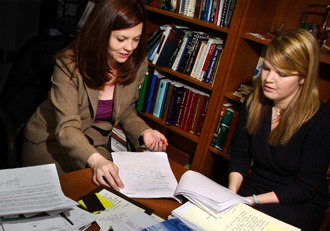Protecting Women Step by Step
Seeking legal services is not an easy process, and for victims of domestic violence, this task can be nearly impossible as they attempt to escape a hazardous relationship. The Tulane Law School Domestic Violence Clinic has created step-by-step protective order kits for women in need.

Tania Tetlow, left, director of the Tulane Law School Domestic Violence Clinic, and Madeleine Minton, the clinic's undergraduate intern, work to provide New Orleans women with protective order kits. (Photo by Guillermo Cabrera-Rojo)
"Part of the culture of this city is that people tend to represent themselves in protective order hearings. The process is supposed to be simple but, in reality, it's quite confusing, and the vast majority of these petitioners lose their hearing," says Tania Tetlow, director of the clinic. "We're making the issues understandable to someone who isn't a lawyer." Tetlow is the Felder-Fayard Associate Professor of Law.
The kits are part of the clinic's mission to provide free legal services to New Orleanians.
"In many areas in Louisiana, domestic violence victims have no access to legal service attorneys to help them obtain protective orders," says Kati Bambrick, director for development and programs for the clinic.
A protective order kit operates as a learning tool for victims who are representing themselves in court for the first time. "The kit is meant to guide victims through the process by using the statewide forms overlaid with explanatory bubbles that are accessible to non-lawyers," says Bambrick.
The kits came together with a joint effort of original research provided by former law students at the clinic and the continued diligent work of undergraduate interns, who have become the current backbone of the project.
"Without the help of undergraduate interns, our students and staff did not have the time to complete this vital project," says Bambrick.
Last semester, Lauren Britsch completed the layout and design of the kits, breaking down the dense material. This semester, Madeleine Minton continues to edit the project, while developing versions that are for Jefferson Parish and translated into Spanish.
Mary Cross is a senior majoring in communication at Tulane.
